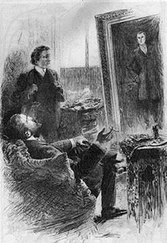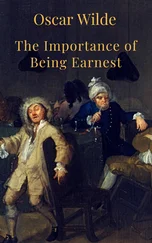He had for many years defied the laws of the county and state, and had built a magnificent residence near a spring that pours its sparkling waters into a small lake, where now stands a sanitarium. Yully had been chief overseer, dictator, and arbitrator of the combined forces of Little Crow and Keya Paha County outlaws and mixed bloods. The end came when, on a bright day in June, a posse led by the United States Marshal sneaked across the Whetstone and secreted themselves in a cache between Yully's corral and the house. Yully was seen to enter the corral and having laid a trap, a part of the men, came in from another direction and made as if to advance when Yully made a run for his house, which took him alongside the men hidden. Before he could change his course he was halted and asked to surrender. He answered by dropping to the opposite side of the horse and began firing. In the skirmish that followed the horse was shot and fell on Yully, but in the shot's exchange two of the posse and Yully were killed.
Table of Contents
This valuable tract of land comprising about fifty thousand acres had been entered after the opening, by settlers, and lay about as near to Kirk as it did to Megory, hence its trade was sought by both towns, but with Kirk getting the larger part until Megory established a mill, which paid two cents more for wheat, and the farmers took advantage by hauling most of their produce to the former town. This included another strip of rich territory to the north of Megory and west of Landing Creek, where the soil is a rich gumbo, and the township thickly settled so it is readily seen that Megory was advantageously situated to draw from all directions. This soon brought such a volume of business into the town as to make the most fastidious envy it, and the Megoryites were well aware of their enviable position. The town continued to grow in a sound, substantial way
Nicholson Brothers began leading booster trade excursions to the north, south, and east, with Ernest at the head in a big "Packard" making clever speeches and inviting all the farmers to come to Calias, where a meal at the best hotel was given free. A good, live, and effective commercial club was organized, which guaranteed to pay all a hog, cow, or calf would bring on the Omaha market, minus the freight and expenses.
Ernest would explain with deep sincerity which impressed the farmers of the valley, as well as the settlers on the Little Crow, that Calias wanted a share of their business, and was willing to sacrifice profit for two years in order to have the farmers come to the town and get acquainted, to see what the merchants, bankers and real estate dealers had to offer. In making this offer the people of Calias had the advantage over Megory, in that it derived profits from other sources, chiefly from great numbers of transients who were beginning to fill the hotels, restaurants, saloons, and boarding houses of the town. Being the end of the road and the place where practically every settler coming to Tipp County must stay at least one night, it stood to reason they could make such an inducement and stick to it.
However, this was countered immediately by Megoryites who promptly organized a commercial club and began the same kind of bid for trade. Thus the small ranchmen of the valley found themselves an object of much importance and began to awaken a little.
Now the land of the reservation had taken on a boom such as had never been realized, or dreamed of. Land in the states of Iowa, Minnesota, Illinois, and Nebraska had doubled in valuation in the previous ten years, and was still on the increase in value. Crops had been good and money was plentiful; with a number of years of unbroken prosperity, the farmers had paid off mortgages and had a good surplus in the bank. Their sons and daughters were looking for newer fields. Retired farmers with their land to rent now, instead of the customary one-third delivered, demanded and received from two-fifths to one-half, or cash, from three to five and six dollars per acre. And with the prices in these states ranging from ninety to one hundred and fifty dollars per acre, which meant from fifteen to twenty-five thousand dollars to buy a quarter section, which the renters felt was too high to ever be paid for by farming it. Therefore, western lands held an attraction, where with a few thousand dollars, some stock, and machinery a man could establish a good home. As this land in southern South Dakota is in the Corn Belt, the erstwhile investor and home-seeker found a haven.
There is always more or less gossip as regards insufficient moisture in a new country. The only thing to kill this bogy is to have plenty of rain, and plenty of rain had fallen on the Little Crow, too much at times. Large crops of everything had been harvested, but if the first three years had been wet, this fourth was one of almost continual rainfall.
In the eastern states the corn crop had been badly drowned out on the low lands, and rust had cut the yield of small grain considerably, while on the rolling land of the Little Crow the season was just right and everything grew so rank, thick and green that it gave the country, a raw prairie until less than four years before, the appearance of an old settled country. It looked good to the buyers and they bought. Farms were sold as soon as they were listed. The price at the beginning of the year had been from twenty-five to forty dollars per acre, some places more, but after the first six months of the year it began to climb to forty-five and then to fifty dollars per acre. Those who owned Little Crow farms became objects of much importance. If they desired to sell they had only to let it be known, and a buyer was soon on hand.
The atmosphere seemed charged with drunken enthusiasm. Everybody had it. There was nothing to fear. Little Crow land was the best property to be had, better, they would declare, than government bonds, for its value was increasing in leaps and bounds. Choice farms close to town, if bought at fifty dollars per acre, could be sold at a good profit in a short time.
This was done, and good old eastern capital continued to be paid for the land.
The spirit of unrest that seem to pervade the atmosphere of the community was not altogether the desire to have and to hold, but more, to buy and to sell. Homesteads were sold in Megory county and the proceeds were immediately reinvested in Tipp, where considerable dead Indian land could be purchased at half the price.
At about that time the auto fever began to infect the restless and over-prosperous settlers, and business men alike. That was the day of the many two-cylinder cars. They made a dreadful noise but they moved and moved faster than horses. They sailed over the country, the exhaust of the engine making a cracking noise. The motion, added to the speed, seemed to thrill and enthuse the investor until he bought whether he cared to or not.
In previous years, when capital was not so plentiful, and when land was much cheaper and slower to sell, the agent drove the buyer over the land from corner to corner, cross-wise and angling, and the buyer would get out here and there and with a spade dig into the ground, and be convinced as to the quality of the soil. He then pondered the matter over for days, weeks, and sometimes months. Then maybe he would go back and bring "the woman." The land dealers seriously object to buyers bringing "the woman" along, especially if the farm he has to sell has any serious drawbacks, such, for instance, as a lack of water. There were numerous farms on the high lands of the Little Crow where water could not be found, but they were invariably perfect in every other respect. The perfection in the laying of the land and quality of the soil was severely offset by the inability to get water. While on the rougher and less desirable farms water can be easily obtained in the draws and the hills. But the high lands were the more attractive and were sold at higher prices and much quicker, regardless of the obvious defects.
Читать дальше












